Prom 43, Solomon, The English Concert, Jeannin review - a Handelian box of delights | reviews, news & interviews
Prom 43, Solomon, The English Concert, Jeannin review - a Handelian box of delights
Prom 43, Solomon, The English Concert, Jeannin review - a Handelian box of delights
Unexpected drama, and tenderness, amid a grand pageant
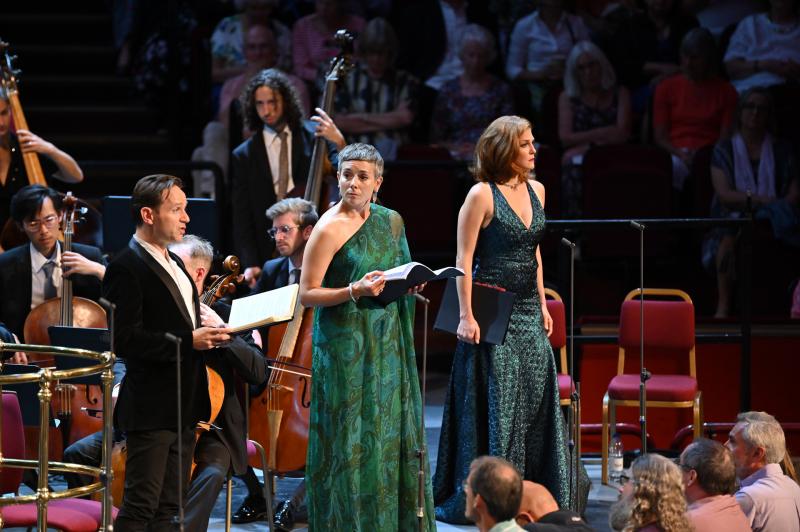
Like many people, I grew up with cut-and-paste Handel. It could take decades before you found out where that shiny snippet of a childhood earworm truly belonged.
A full-length Solomon, for instance – as delivered by The English Concert with a luxury handful of soloists at the Proms – will reveal that the so-called “Arrival of the Queen of Sheba” (named, it seems by Thomas Beecham) takes place just after an extraordinary middle act. In it, two “harlots” compete before the wise king for custody of a babe both claim as theirs. Exercising that famous judgment, Solomon orders the kid to be bisected – whereupon the real mother yields to the fake to save her son (and so wins in the end). A work written off by some music histories as a static, even lifeless procession with a duff Bible-based libretto turns out – with the right interpretation – to have a wrenching drama at its core to match anything in Handel’s operas.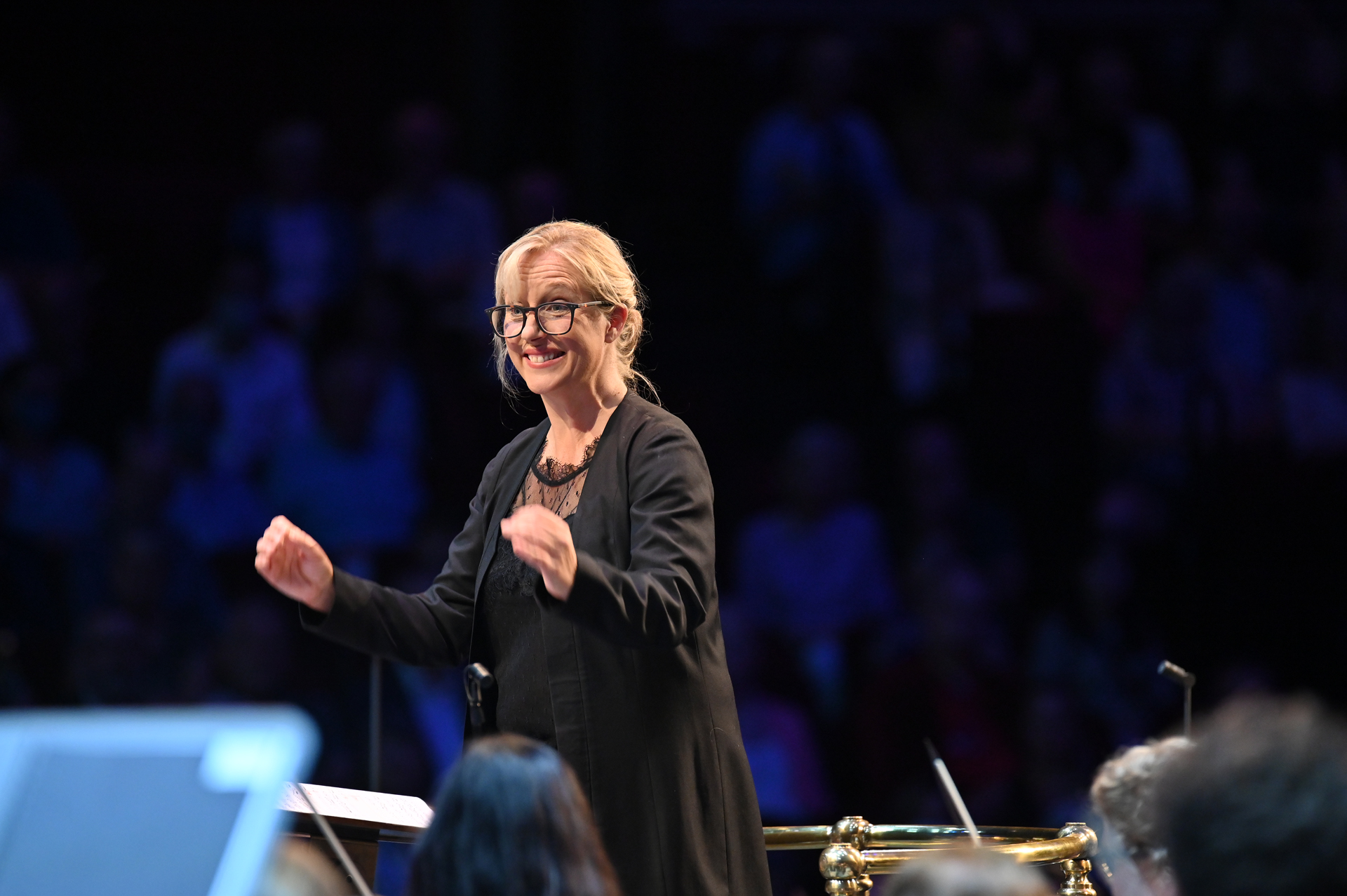 With Sofi Jeannin (pictured above) conducting The English Concert, this Solomon (wisely) had no attempt to stage the oratorio’s music in a fussily intrusive way. In any case, it would would be a big ask to transform the whole pageant-like work into credible music-theatre, as (for instance) has happened with Theodora – written in the following year. So mezzo Wallis Giunta simply changed frocks (into a suitably spangly number) as she moved from “Second Harlot” to Queen of Sheba, while the strategic placing of trumpets, woods and timpani made the most of the multiple thrills that stud Handel’s score. Otherwise, the music – and the singing – supplied drama aplenty.
With Sofi Jeannin (pictured above) conducting The English Concert, this Solomon (wisely) had no attempt to stage the oratorio’s music in a fussily intrusive way. In any case, it would would be a big ask to transform the whole pageant-like work into credible music-theatre, as (for instance) has happened with Theodora – written in the following year. So mezzo Wallis Giunta simply changed frocks (into a suitably spangly number) as she moved from “Second Harlot” to Queen of Sheba, while the strategic placing of trumpets, woods and timpani made the most of the multiple thrills that stud Handel’s score. Otherwise, the music – and the singing – supplied drama aplenty.
Iestyn Davies’s regal, assured and deeply expressive counter-tenor (pictured below) commanded from first note to last as the sage monarch: a taxing role originally composed (in 1748) for a mezzo, Caterina Galli. Like Giunta, soprano Anna Dennis also played twin parts with quick-change versatility, as Solomon’s Queen and the vindicated mother (aka “First Harlot”). Benjamin Hulett’s Zadok the priest, Ashley Riches’ Levite and Peter Davoren’s Attendant made up the rest of the court personnel, each injecting colour, light and shade into their long, grave (and potentially wearying) recitatives and stately arias. 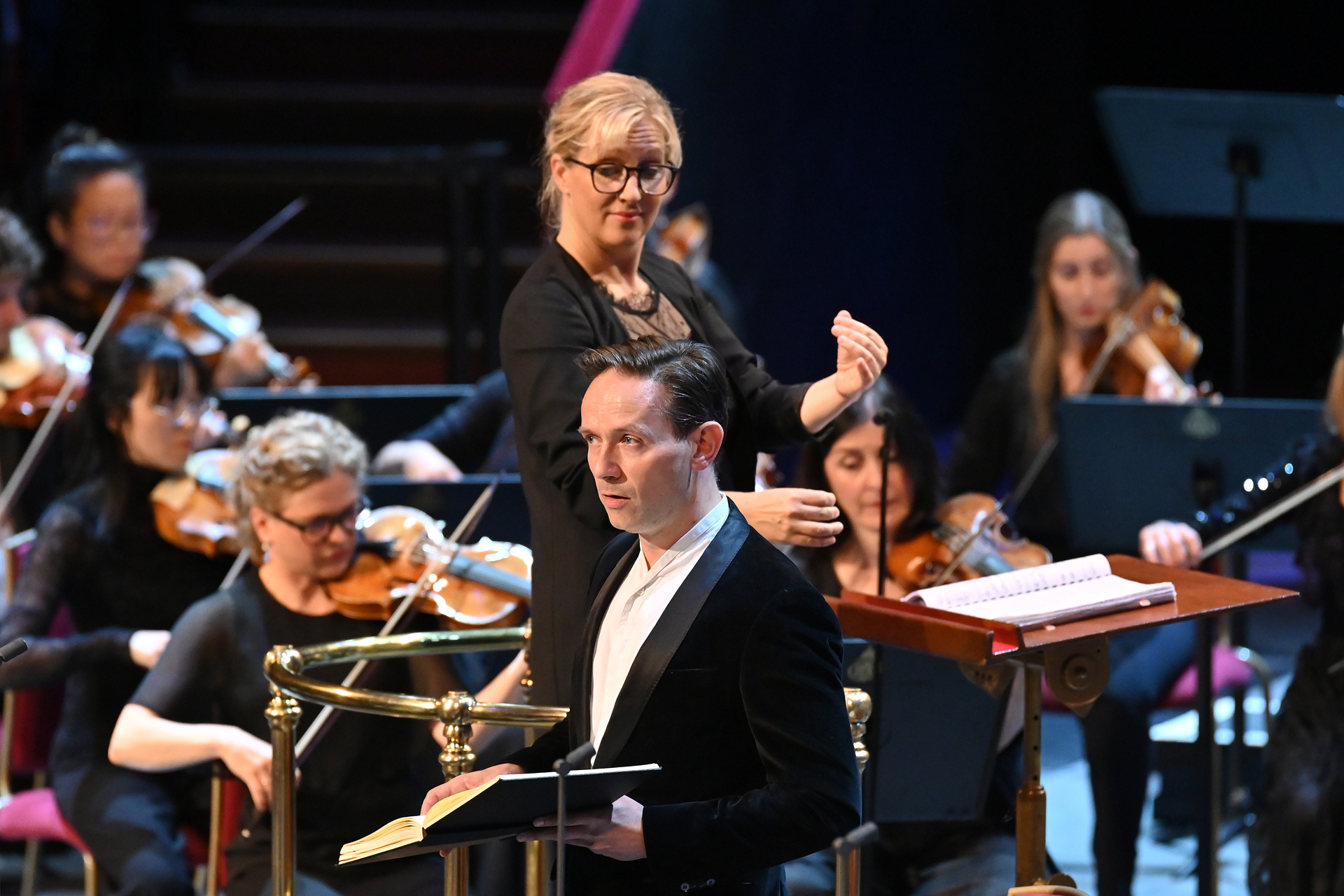 The BBC Singers – 24-strong, but mighty and athletic enough when the occasion demanded – became a personality in the own right in their forcefully executed commentaries, interjections and praise-songs, often written with a zesty antiphonal dialogue between the parts. As for the orchestra, it feasted on the ever-changing flavours and textures that Handel demands from his band with perky, nicely accented woodwind pairs balancing the rich string sound. The show-stopping passages here can match anything in his vast oeuvre.
The BBC Singers – 24-strong, but mighty and athletic enough when the occasion demanded – became a personality in the own right in their forcefully executed commentaries, interjections and praise-songs, often written with a zesty antiphonal dialogue between the parts. As for the orchestra, it feasted on the ever-changing flavours and textures that Handel demands from his band with perky, nicely accented woodwind pairs balancing the rich string sound. The show-stopping passages here can match anything in his vast oeuvre.
That said, not much happens. Solomon is lauded for his wisdom and justice. Hey, guys, I owe it all to Jehovah, he replies. Yeah, it’s tough at the top, but the Big Man guides me (even when I killed my own half-brother, Adonijah). The “Harlots” turn up with their cradle-snatching accusations. Good old Sol sorts them out. Then it’s the Queen of Sheba on a diplomatic visit: let’s pull out all the stops to overawe the lady. Fancy place you’ve got here, she sings. More praise. More piety. More propaganda? Solomon was taken as a veiled eulogy to George II and the Hanoverian monarchy in Britain – in a piece written three years after Jacobite armies marched unopposed as far as Derby in the rebellion of 1745. Sometimes, you have to read between the lines.
Given its content (or lack thereof), a full-dress Solomon in the pompous, old-school oratorio style would feel pretty insupportable. Thankfully, Jeannin, with her singers and players, found the tenderness, playfulness and moments of wonder and affection that nestle within the palatial grandeur of this work. The king’s arbitration of the quarrel between the mothers (actual or pretended) has – at least, last night it had – an edge, intensity and pathos to rival stand-out scenes in the operas its composer no longer wrote.
Giunta’s part, as the delusional baby-claimant, has all the crazed, coloratura witchiness that Handel wrote so well, and she rose to its challenge in fine style. As the “good mother”, Dennis (pictured below) held firm with a poised poignancy and dignity. That this all-too-human drama unfolds between two knockout choruses – with snortingly eloquent trumpets, woods and timpani, and entwined vocal lines that eddy, swell, surge and break with hair-raising power – only leaves you even more in awe of Handel’s own heaven-sent powers of judgment. 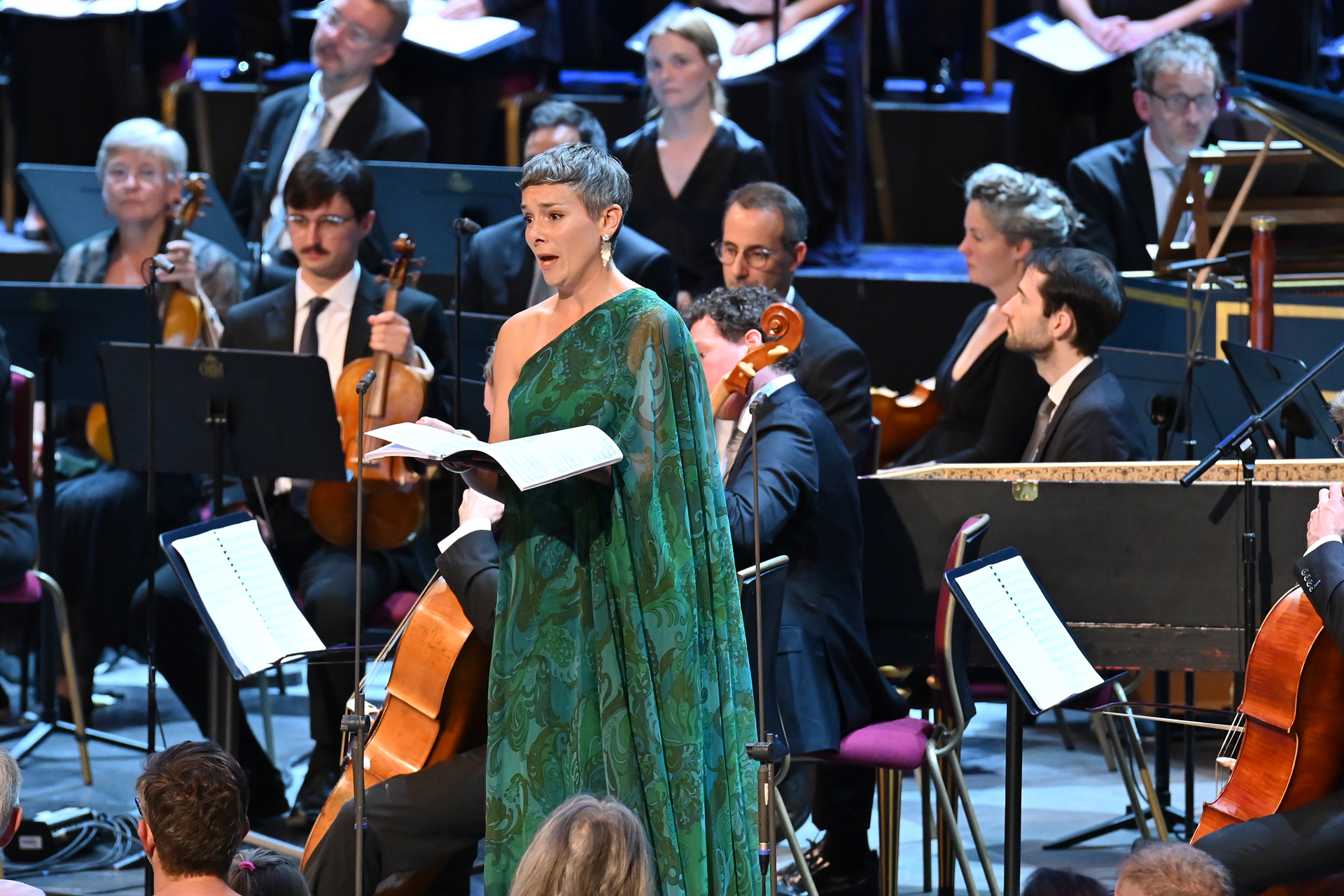 Solomon, though, does have its longueurs. Zadok and the Levite must search for movement and variety in long stretches of laudatory guff. Hulett’s tenor had a polished suavity and nobility, and Riches’ bass-baritone a teak-hued depth and fullness, that helped bring flesh to these ceremonial roles. Though the anonymous libretto has touches of the purest panto (how about “Thou fair inhabitant of Nile,/ Rejoice thy lover with a smile!”?), Davies’s Solomon showed such a warm, relaxed mastery across his range that bathos never threatened. Besides, you know that soon enough the sun of Handel’s skittish, even shameless inventiveness will break through the Biblical clouds – whether in the impossibly pretty flutes that enliven the choral blessing on the royal couple (“May no rash intruder disturb their soft hours”) or the Messiah-level splendour of set-pieces such as the concluding “Praise the Lord with harp and tongue!” Jeannin kept the orchestral interludes (Sheba’s arrival included) brisk and bright; she allowed enough space for those glorious instrumental parts to dazzle, and brought a loose-limbed swing and lilt to several sections that offset any tendency to puffed-up grandiosity in the material.
Solomon, though, does have its longueurs. Zadok and the Levite must search for movement and variety in long stretches of laudatory guff. Hulett’s tenor had a polished suavity and nobility, and Riches’ bass-baritone a teak-hued depth and fullness, that helped bring flesh to these ceremonial roles. Though the anonymous libretto has touches of the purest panto (how about “Thou fair inhabitant of Nile,/ Rejoice thy lover with a smile!”?), Davies’s Solomon showed such a warm, relaxed mastery across his range that bathos never threatened. Besides, you know that soon enough the sun of Handel’s skittish, even shameless inventiveness will break through the Biblical clouds – whether in the impossibly pretty flutes that enliven the choral blessing on the royal couple (“May no rash intruder disturb their soft hours”) or the Messiah-level splendour of set-pieces such as the concluding “Praise the Lord with harp and tongue!” Jeannin kept the orchestral interludes (Sheba’s arrival included) brisk and bright; she allowed enough space for those glorious instrumental parts to dazzle, and brought a loose-limbed swing and lilt to several sections that offset any tendency to puffed-up grandiosity in the material. 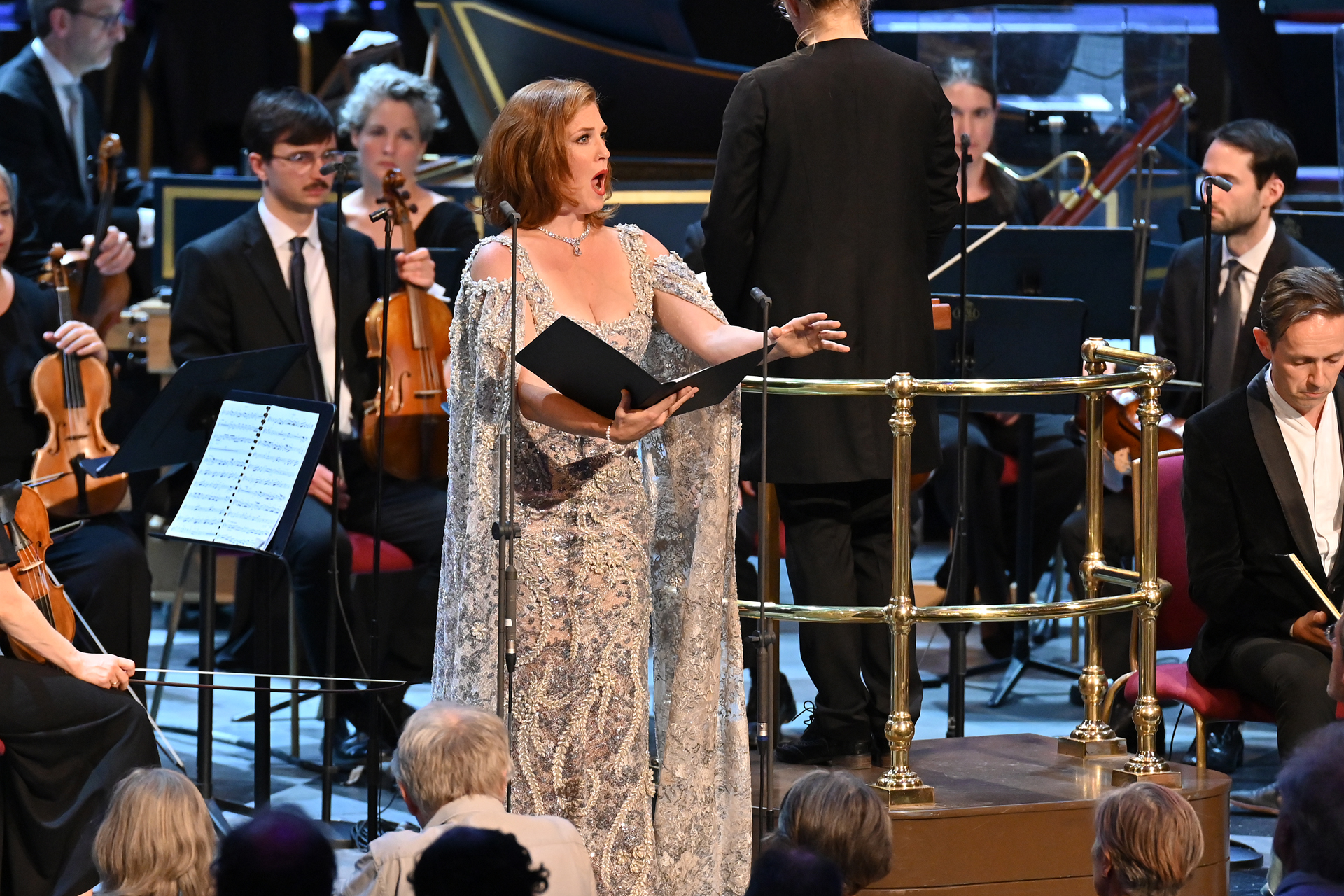 While the king displays his top-of-the-range amenities to Giunta's Sheba (pictured above), the music segues into a sort of stylistic shop-window. It offers up one tasty Handelian speciality after another: like a GFH chocolate-box selection, from dainty pastoral air to scary storm effects and even (“Though rolling surges rise, and plough the troubled main”) something rather like a sea-shanty. Terrific fun, absurdly smart, beautifully performed – and with a hint, perhaps, that Handel didn’t take his implicit brief of bigging up the corrupt and despised Hanoverians entirely seriously. No matter: Solomon lets us enjoy its protean composer in a dozen flavours (sweet, nutty, creamy, dark, fruity), while each of these treats came served with artistry and flair. And now I know what goes down before (and after) the Queen of Sheba sails through the door.
While the king displays his top-of-the-range amenities to Giunta's Sheba (pictured above), the music segues into a sort of stylistic shop-window. It offers up one tasty Handelian speciality after another: like a GFH chocolate-box selection, from dainty pastoral air to scary storm effects and even (“Though rolling surges rise, and plough the troubled main”) something rather like a sea-shanty. Terrific fun, absurdly smart, beautifully performed – and with a hint, perhaps, that Handel didn’t take his implicit brief of bigging up the corrupt and despised Hanoverians entirely seriously. No matter: Solomon lets us enjoy its protean composer in a dozen flavours (sweet, nutty, creamy, dark, fruity), while each of these treats came served with artistry and flair. And now I know what goes down before (and after) the Queen of Sheba sails through the door.
rating
Explore topics
Share this article
The future of Arts Journalism
You can stop theartsdesk.com closing!
We urgently need financing to survive. Our fundraising drive has thus far raised £49,000 but we need to reach £100,000 or we will be forced to close. Please contribute here: https://gofund.me/c3f6033d
And if you can forward this information to anyone who might assist, we’d be grateful.

Subscribe to theartsdesk.com
Thank you for continuing to read our work on theartsdesk.com. For unlimited access to every article in its entirety, including our archive of more than 15,000 pieces, we're asking for £5 per month or £40 per year. We feel it's a very good deal, and hope you do too.
To take a subscription now simply click here.
And if you're looking for that extra gift for a friend or family member, why not treat them to a theartsdesk.com gift subscription?
more Classical music
 Bizet in 150th anniversary year: rich and rare French offerings from Palazzetto Bru Zane
Specialists in French romantic music unveil a treasure trove both live and on disc
Bizet in 150th anniversary year: rich and rare French offerings from Palazzetto Bru Zane
Specialists in French romantic music unveil a treasure trove both live and on disc
 Scottish Chamber Orchestra, Ibragimova, Queen’s Hall, Edinburgh review - rarities, novelties and drumrolls
A pity the SCO didn't pick a better showcase for a shining guest artist
Scottish Chamber Orchestra, Ibragimova, Queen’s Hall, Edinburgh review - rarities, novelties and drumrolls
A pity the SCO didn't pick a better showcase for a shining guest artist
 Kilsby, Parkes, Sinfonia of London, Wilson, Barbican review - string things zing and sing in expert hands
British masterpieces for strings plus other-worldly tenor and horn - and a muscular rarity
Kilsby, Parkes, Sinfonia of London, Wilson, Barbican review - string things zing and sing in expert hands
British masterpieces for strings plus other-worldly tenor and horn - and a muscular rarity
 From Historical to Hip-Hop, Classically Black Music Festival, Kings Place review - a cluster of impressive stars for the future
From quasi-Mozartian elegance to the gritty humour of a kitchen inspection
From Historical to Hip-Hop, Classically Black Music Festival, Kings Place review - a cluster of impressive stars for the future
From quasi-Mozartian elegance to the gritty humour of a kitchen inspection
 Shibe, LSO, Adès, Barbican review - gaudy and glorious new music alongside serene Sibelius
Adès’s passion makes persuasive case for the music he loves, both new and old
Shibe, LSO, Adès, Barbican review - gaudy and glorious new music alongside serene Sibelius
Adès’s passion makes persuasive case for the music he loves, both new and old
 Anja Mittermüller, Richard Fu, Wigmore Hall review - a glorious hall debut
The Austrian mezzo shines - at the age of 22
Anja Mittermüller, Richard Fu, Wigmore Hall review - a glorious hall debut
The Austrian mezzo shines - at the age of 22
 First Person: clarinettist Oliver Pashley on the new horizons of The Hermes Experiment's latest album
Compositions by members of this unusual quartet feature for the first time
First Person: clarinettist Oliver Pashley on the new horizons of The Hermes Experiment's latest album
Compositions by members of this unusual quartet feature for the first time
 Gesualdo Passione, Les Arts Florissants, Amala Dior Company, Barbican review - inspired collaboration excavates the music's humanity
At times it was like watching an anarchic religious procession
Gesualdo Passione, Les Arts Florissants, Amala Dior Company, Barbican review - inspired collaboration excavates the music's humanity
At times it was like watching an anarchic religious procession
 Classical CDs: Camels, concrete and cabaret
An influential American composer's 90th birthday box, plus British piano concertos and a father-and-son duo
Classical CDs: Camels, concrete and cabaret
An influential American composer's 90th birthday box, plus British piano concertos and a father-and-son duo
 Cockerham, Manchester Camerata, Sheen, Martin Harris Centre, Manchester review - re-enacting the dawn of modernism
Two UK premieres added to three miniatures from a seminal event of January 1914
Cockerham, Manchester Camerata, Sheen, Martin Harris Centre, Manchester review - re-enacting the dawn of modernism
Two UK premieres added to three miniatures from a seminal event of January 1914
 Kempf, Brno Philharmonic, Davies, Bridgewater Hall, Manchester review - European tradition meets American jazz
Bouncing Czechs enjoy their Gershwin and Brubeck alongside Janáček and Dvořák
Kempf, Brno Philharmonic, Davies, Bridgewater Hall, Manchester review - European tradition meets American jazz
Bouncing Czechs enjoy their Gershwin and Brubeck alongside Janáček and Dvořák
 Solomon, OAE, Butt, QEH review - daft Biblical whitewashing with great choruses
Even a top soprano and mezzo can’t make this Handel paean wholly convincing
Solomon, OAE, Butt, QEH review - daft Biblical whitewashing with great choruses
Even a top soprano and mezzo can’t make this Handel paean wholly convincing

Add comment